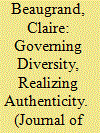|
|
|
Sort Order |
|
|
|
Items / Page
|
|
|
|
|
|
|
| Srl | Item |
| 1 |
ID:
175805


|
|
|
|
|
| Summary/Abstract |
In a tweet posted on 29 March 2018, a bidūn activist—who was later jailed from July 2019 to January 2020 for peacefully protesting against the inhumane conditions under which the bidūn are living—shared a video. The brief video zooms in closely on an ID card, recognizable as one of those issued to the bidūn, or long-term residents of Kuwait who are in contention with the state regarding their legal status. More precisely, the mobile phone camera focuses on the back of the ID card, on one line with a special mention added by the Central System (al-jihāz al-markazī), the administration in charge of bidūn affairs. Other magnetic strip cards hide the personal data written above and below it. A male voice can be heard saying that he will read this additional remark, but before even doing so he bursts into laughter. The faceless voice goes on to read out the label in an unrestrained laugh: “ladayh qarīb … ladayh qarīna … dālla ʿalā al-jinsiyya al-ʿIrāqiyya” (he has a relative … who has presumptive evidence … suggesting an Iraqi nationality). The video shakes as the result of a contagious laugh that grows in intensity.
|
|
|
|
|
|
|
|
|
|
|
|
|
|
|
|
| 2 |
ID:
162258


|
|
|
|
|
| Summary/Abstract |
The Iraqi claims on and invasion of Kuwait have focused most of the scholarly attention on the drawing and defining of the Kuwaiti border. Issues of material delineation between the two countries have mattered a great deal for asserting sovereignty, but also for the exploration of oil and access to Gulf deep waters. Yet, the identity dimensions of the Kuwaiti border have often been overlooked. Building on the literature that sees more to the border than just a dividing line but seeks to include individual and collective narrative and experiences of borders, this article proposes to investigate the social–cultural perception of the Kuwaiti border and explores the complex connection between border and identities in the Kuwaiti case. Borders, it has been argued, have often played a significant role in identity building processes. Yet in the case of Kuwait where the border, contested by powerful neighbours, cuts across empty desert and tribal territories, the border seems to have played a limited one in shaping the national identity. This article investigates the interplay between the bordering process asserting sovereignty, on the one hand and the notions of identity and sense of belonging, on the other, resulting from a complex mix of socio-cultural legacies inherited from the pre-national period (the hadhar/badû dichotomy) and processes of ordering and othering enacted by the state and its welfare policies. Based on the analysis of the spatial imaginary as constructed by the Nationality Law of 1959, it argues that the urban core of the port-city or the interaction with it have remained the main benchmark of Kuwaiti identity, while the desert periphery has been imagined as culturally distinct and economically backward in the oil era – a representation that nevertheless provides a reservoir of symbols and narratives ready to be reimagined or appropriated.
|
|
|
|
|
|
|
|
|
|
|
|
|
|
|
|
| 3 |
ID:
190343


|
|
|
|
|
| Summary/Abstract |
Most of the Gulf states where foreigners make up the majority of the population value positively the diversity of their societies. Bahrain, Qatar and the United Arab Emirates publicly celebrate this diversity as a new form of cosmopolitanism. However, in Kuwait the official narrative, shaped partially by public figures’ statements in the Parliament, represents the country’s demographic composition and the presence of a wide diversity of foreign communities as impeding its social harmony and economic prosperity. This article builds on Michael Herb’s work on identifying the source of the Kuwaiti idiosyncrasy in the system of political participation that gives nationals voice and precedence, and seeks to understand Kuwait’s peculiar discursive governance of diversity. It contends that the official Kuwaiti understanding of authenticity has led to a political culture that emphasizes exclusiveness and cultural nationalism. In the UAE and other countries, on the contrary, this authenticity is staged and endowed with self-Orientalizing overtones so that it works, in the official discourse, as a pre-condition for a new kind of consumerist universalism based on cultural pluralism. The article first presents the different discursive approaches to diversity in the four Gulf states with a majority of foreigners. It then compares Kuwait and the UAE, examining how the Kuwaiti political system enabled the issue of naturalisations –– embodied by the handling of the bidūn files –– to be constructed as a public issue, and posits that this played a significant role in Kuwait’s tenacious emphasis on exclusion and authenticity.
|
|
|
|
|
|
|
|
|
|
|
|
|
|
|
|
|
|
|
|
|